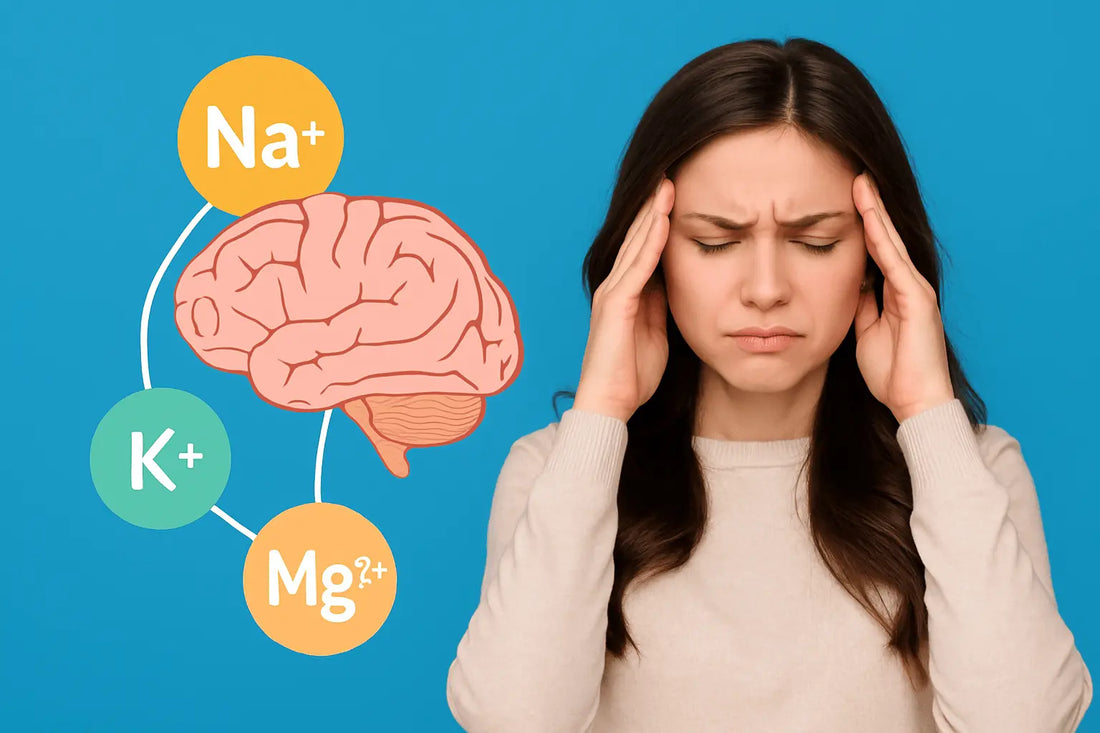
What's the connection between Electrolytes and our Moods
Share
Ever had one of those days where you're dragging mentally, snapping at small things, or just feeling off for no obvious reason? Sure, sleep and stress play a role, but there might be something else going on that doesn't get talked about enough: electrolytes.
Most people think of electrolytes in the context of sports drinks or dehydration. Maybe you picture a post-workout chug or something for a hangover. But electrolytes do more than just help with hydration. They’re actually central to how your brain and nervous system operate. That includes your mood.
Essential Takeaways
- Electrolytes affect how your brain communicates, making them a key player in mood regulation and mental clarity.
- Imbalances can lead to symptoms like irritability, anxiety, and low energy, even if you're drinking plenty of water.
- Rescue Drops support electrolyte balance with zero sugar or stimulants, helping you stay emotionally and physically steady throughout the day.
This post explores how electrolyte balance (or imbalance) can impact the way you feel mentally and emotionally, and why it’s worth paying attention to-even if you're not an athlete or sweating buckets. It’s not about gimmicks or miracle cures, just some straightforward insight into how the body works and how something as simple as Rescue Drops can make a noticeable difference.
- The Brain is Electric, Literally
- What Happens When You’re Low
- Mood Swings and Hydration Gaps
- How Electrolytes Influence Stress and Calm
- Who Needs Electrolyte Support for Mood?
- Better Mood Starts with Better Basics
The Brain is Electric, Literally
Your brain isn’t just a blob of thoughts floating around. It’s an electrical machine made up of signals moving from one neuron to another. Those signals don’t work without electrolytes. Sodium, potassium, calcium, and magnesium are the big players here. They help fire off messages between cells, regulate nerve function, and keep things like focus, memory, and mood in check.
When electrolyte levels dip too low or swing too high, those signals get scrambled. Think of it like a power outage or a flickering light - you’re still functioning, but things don’t work as smoothly. That’s when you might feel foggy, irritable, or unusually tired. Your body is still pushing forward, but your mood takes the hit.
What Happens When You’re Low
Mild electrolyte imbalances are more common than most people think. You don’t need to be sprinting in the sun or running a marathon to lose key minerals. Stress, certain medications, processed foods, poor sleep, or even just drinking tons of plain water without any minerals can dilute electrolytes.
And the signs are easy to miss. You might feel more anxious than usual, snap at people, or have trouble concentrating. You might chalk it up to a bad day or blame caffeine withdrawal. But the underlying issue could be something as simple as not getting enough sodium or potassium.
Magnesium is another one worth highlighting. It helps regulate neurotransmitters like serotonin and dopamine. When magnesium is low, you’re more likely to feel stressed out or emotionally reactive. Some people even experience mild depression or chronic fatigue. These symptoms can show up without warning, and they often pass quickly, which makes them easy to dismiss. But when they’re recurring, it’s worth checking whether your body is actually getting what it needs.
Mood Swings and Hydration Gaps
Hydration and mood are linked, but not in the way most people assume. Drinking water is obviously important, but without electrolytes to help that water move through your cells and keep everything balanced, hydration doesn’t do much. In fact, drinking too much plain water can flush out the minerals your body actually needs. [1]
That’s where Rescue Drops come in. They give you electrolytes in a form your body can actually use- without sugar, artificial sweeteners, or caffeine that can mess with your energy and mood. The formula includes sodium, potassium, magnesium, and trace minerals that support both hydration and nervous system function. It’s designed to be fast-absorbing, so you can feel the difference without waiting around or riding a caffeine rollercoaster.
What the Science Says About Electrolytes and Mood
Scientific research backs up the connection between hydration, electrolytes, and mental well-being. One study published in Nutrients found that mood and cognition were significantly affected by hydration status - and that electrolytes played a role in whether hydration actually made a difference [1]. Interestingly, even the colour of the drink influenced participants’ responses, highlighting how psychological and physiological signals work together.
In short, it’s not just about drinking more water. It’s about getting the right hydration mix - including electrolytes - to actually support your brain and mood. That’s exactly what Rescue Drops aim to deliver, in a clean, no-fuss format that your body can absorb quickly and efficiently.
How Electrolytes Influence Stress and Calm
Your stress response system (think fight-or-flight mode) relies heavily on electrolyte balance. When stress spikes, your adrenal glands ramp up, which can deplete minerals like magnesium and potassium. If those stores aren’t replenished, it gets harder for your body to come back down. That keeps you stuck in a low-level stress state - tense, reactive, and mentally drained.
Balanced electrolytes help buffer that stress response. Magnesium, for example, plays a role in regulating cortisol and calming the nervous system. Sodium helps with fluid balance and blood pressure, which can influence how jittery or sluggish you feel. When these minerals are where they should be, it’s easier to stay calm and mentally steady - even when life’s a bit chaotic.
Some people notice this difference after just one or two days of adding electrolyte support. You might feel less reactive, more able to focus, or less drained after a long meeting or a tough workout. It’s not about feeling superhuman - it’s about removing the friction so your body and brain can do what they’re supposed to do.
Who Needs Electrolyte Support for Mood?
You don’t need to have a diagnosed condition to benefit from electrolytes. Plenty of people live with mild fatigue, irritability, or concentration issues without ever connecting the dots back to minerals.
That said, there are some situations where electrolyte support can be especially helpful:
-
If you’re under chronic stress or recovering from burnout
- If you drink a lot of coffee or alcohol (both can deplete minerals)
- If you sweat often or live in a hot climate
-
If you follow a low-carb or fasting lifestyle
- If you regularly experience brain fog or mood swings
In any of these cases, adding something like Rescue Drops to your daily drink can give your body the mineral foundation it’s missing.
Better Mood Starts with Better Basics
It’s easy to get caught up in the idea that mood is all about mindset or mental health tools. Those matter, no doubt. But mood is also about physiology. The brain can’t fire properly without fuel, and electrolytes are part of that equation.
Supporting your mood doesn’t always mean overhauling your life. Sometimes it’s as simple as making sure you’re actually hydrated - at the cellular level - and giving your nervous system the tools it needs to reset and regulate.
Rescue Drops make that easier. Just a few drops in your water give you fast-absorbing electrolytes and trace minerals without anything extra. No sugar. No flavors. No spikes or crashes. Just steady support for your brain and body.
When your internal systems are balanced, your mood often follows. You don’t have to force it. You just feel a little more grounded, a little less reactive, and more able to deal with the stuff that life throws at you. That’s real support.
References:
[1] Waters, S., Stevenson, E. J., & Mears, S. A. (2023). The Effect of Hypo-Hydration on Mood and Cognition Is Influenced by Electrolyte in a Drink and Its Colour: A Randomised Trial. Nutrients, 15(16), 3521. https://doi.org/10.3390/nu15163521
[2] Benton, D., & Young, H. A. (2015). Do small differences in hydration status affect mood and cognitive function? Nutrition Reviews, 73(Suppl 2), 83–96. https://doi.org/10.1093/nutrit/nuv045
[3] Armstrong, L. E., Ganio, M. S., Casa, D. J., Lee, E. C., McDermott, B. P., Klau, J. F., & Maresh, C. M. (2012). Mild dehydration affects mood in healthy young women. The Journal of Nutrition, 142(2), 382–388. https://doi.org/10.3945/jn.111.142000
[4] Lieberman, H. R. (2007). Hydration and cognition: A critical review and recommendations for future research. Journal of the American College of Nutrition, 26(Suppl 5), 555S–561S. https://doi.org/10.1080/07315724.2007.10719666




